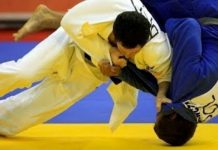Imagine leaving a party having had too much to drink and suddenly finding yourself attacked by three individuals! It’s a blitz attack in the dark, so you didn’t see it coming and worse, the three people were “friends” you knew in high school. Suddenly you are being held and beaten in the dark. Literally held from behind and pummeled!
You can’t believe this is happening and then, it gets worse. You’re in the fog of being beaten by people you know, at the same time trying to clear your head, sober up, and figure out what to do. Right about then you’re dropped to the ground and they’re kicking you in the head and body, then repeatedly stomping your face and head. You’re fighting to stay conscious, while still trying to make some sense out of what’s happening, and then darkness!
At that point there are three alternatives available:
- Give up and suffer whatever consequences may come,
- Lay there in desperation and maybe someone will find you and help you out, or
- Call upon that deepest of instincts and take action to survive.
From deep in the limbic brain, the place where each of us still have pure “animal instinct,” comes the will to blindly get up and take action, more a state of “no sanity” than insanity. The only action available to the warrior is #3, survive or die!
Even from a limited cognitive state, training and muscle memory take over, coupled with the animal that is in all of us. If no serious training has taken place, “whatever works” works or doesn’t.
If the body has been trained through repetitive movement, the muscles and subconscious memory have stored the actions necessary to fight through the life-or-death situation.
There are no guarantees, but the odds are better if training has been undertaken and “the desire to get home” is strong.
One of the three has left and suddenly the other two are walking away. Somehow through the darkness an awareness strikes, the “animal takes over,” and as messed up as you are, you take action. Rushing the two from behind, your survival instinct comes into play and you attack.
You’re not cognizant of exactly what you’re doing, but “survival at all costs” is at play, and what ensues can only be termed “ugly.” No concern for form or technique, just neutralizing your attackers – the retaliation is quick and dirty. All you are aware of is someone in the fog of the whole mess yelling, “Wait, we’ll take you home!” You run off into the night, bloody, broken, and not able to think clearly.
While the previous account sounds like something out of a movie, it happens in reality, and for some reason the “victim” survives and may even emerges the victor. There are times in our lives when we must survive or ultimately face death in defeat, whether metaphorically or in fact.
These are times when inaction, or giving up, doesn’t yield acceptable results. What drives someone to emerge out of the heat of conflict, broken and battered, to lick his wounds and carry on?
Not being an expert on the topic of survival, I can only offer my opinion, learning, and philosophical perspective on what sets up the circumstances around making the “right” decisions and taking relevant actions in those few seconds when life or death depend on it.
Most people in the western world today are unprepared for the actions they may need to take, given an unexpected assault, attack, or accident. Anyone can be taken totally by surprise by an event in the course of their daily life. This gives them no time to plan the actions necessary to survive; they are left only to do what’s absolutely necessary to escape the circumstances they find themselves in, without being caught on the wrong side of life or death.
Certainly, first responders and military operators train for the unexpected on an almost daily basis, and many martial artists train their minds and bodies for such an event. However, martial artists are more likely to train in a “laboratory environment,” whereas first responders and military personnel are more likely to be confronted with a life-or-death situation at almost any time.
So how does one prepare for making it through a life-or-death situation before it ever happens? Perhaps a more common question in today’s world might be, why should one prepare himself for such a situation when the odds aren’t very high for such a thing to happen?
The answer could be just to be ready for anything that could present itself. In the case of the military and first responders, whether or not they really expect a life-or-death situation to be lurking around every corner all-the-time, they must constantly prepare.
When are Life-or-Death Decisions Made?
Life-or-death decisions are certainly made on the spur of the moment, and fight-or-flight follows, but what moves that decision into action? We can spend hours, days, and even years training our bodies and minds to take action based on specific stimuli. We can mentally and physically choreograph the action we will take if or when a life-threatening event takes place, and know just what to do and how to do it, or so we think.
It is common knowledge among those who study disastrous events, whether it’s a weather phenomenon or a blitz attack on the street, that things never go exactly as we’ve prepared for them to go. In reality, events go totally sideways and inside out, all of the elements are there, but none of the organization, and stuff just happens. It seems like, whether or not we spend a lot of time training or just let things happen as they will, we are totally at the mercy of the event. Here are a couple of facts about life threatening events:
They happen randomly, making no sense (for example, they’re not dependent on nice weather, light or dark, physical location, or who you are with.
You are likely to respond in one of three major ways, probably based on your personal mental and physical preparation:
- If you’ve trained, you may respond or react using elements of your training to take the actions necessary to survive, this is especially true if part of your mental preparation was to survive at all costs, so you will likely fall back on what your mind and body “know.”
- If you have not trained, you simply lash out and do something, take any action, maybe, just maybe, you will get lucky.
- If you have not trained and you don’t want to fight, you might curl up into the fetal position and hope you don’t get killed (we might call this, “I’ll surrender and maybe things will work out okay, because everything is based in goodness.”
It seems like just doing anything, or hoping everything will work out okay, have their pitfalls. Even being well-trained and mentally prepared has its problems, but the risks are reduced by having a clue and the drive to survive.
Because of the instantaneous and unexpected nature of life-threatening events, decisions of fight-or-flight, or to assess and take action, are literally made in a split second, and with not a moment to spare!
That moment may seem to take minutes, but at the speed of the human brain, perhaps only microseconds pass – fight-or-flight decisions in the moment might better be termed life-or-death.
What Decides the Fight-or-Flight Decision?
Awareness plays an important part, even in that microsecond before action is taken. If we are trained, even in the dojo, there is a certain feeling, or set of feelings, that takes place when things are about to go awry. It might appear as anxiety, or the hair standing up on the back of our neck, or just a sense that everything is not okay.
We might have seen something we didn’t consciously know we saw, something that puts us in a heightened state. It might be a glance, a gesture, or a movement that brings at least our subconscious to an alert state and triggers the action required to survive, whether through avoidance, evasion, or engagement.
However, as in the example given at the beginning of this chapter, you may not have the awareness to even know the danger that you face until it’s in progress. That lack of awareness, that you have to conquer, might be caused by coming out of a deep sleep, self-induced by alcohol or drugs (legal or otherwise), a concussion or other injury, or illness that dulls the senses, or just trying to get a grip on what is happening to you.
The life-or-death decision starts a blinding flash of clarity, in a process that I term “getting a grip,” which can change your state from the haze of confusion to survival at all costs! This change of state hopefully happens before it’s too late. When the awareness takes place, action must follow!
As presented at the beginning of this chapter, a life-or-death situation can come at the most unexpected time, with no warning, and from sources that may not make sense.
It took pretty much the entire length of the beating for the victim of the assault to snap out of it and make the life-or-death decision. Possibly, in this case, the alcohol-induced daze may have played in the victim’s favor, and maybe even in the attackers’ favor.
Why would it have been in the attackers’ favor? Think about what might have happened if the victim had not been so impaired? After all, the attackers chose to take on the victim as a group, and only when his defenses were down! One can only imagine why.
In this case, the life-or-death decision was made when seconds counted, and probably a little late. It wasn’t just to survive and get away, but to retaliate in kind and then leave the scene, all the while, in a state which could easily be called blind rage, not cognitive reality. Given other circumstances, this would not have been the best choice of actions. This was a state in which the “animal within” leapt out of control and took the offensive and, thank all that is Mighty, that no one was killed!
The result of a decision made when seconds count doesn’t have to be some violent encounter. It may simply be gathering oneself and perhaps others and getting to safety, or presenting oneself as someone who shouldn’t be taken lightly, with a subtle smile and an air of confidence, or walking away before things go south. Whatever the action, it should serve to end the situation, and it must take place quickly.
There is no perfect formula for making a conscious or subconscious decision, when life-or-death is in the balance. True enough, if we spend time training to respond to dangerous circumstances, or even just thinking about courses of action that might be taken, we are programming our responses to make a life-or-death action – when seconds count!
It’s not easy for me to write about walking away from a situation that could have ended a lot worse than it did. It dredged up a lot of memories that I’d rather forget! I was home on leave in late 1964, when I went to that party and drank far too much alcohol, and walked out with “friends,” or what we call friends when we’re 19 or 20 years old.
It took four or five years of nightmares and bubbling fragments of memories. I only really remember going to that house party, being picked up by a friendly police officer who I knew well, and driven home, a mangled mess.
He dropped me off in the driveway, so he wouldn’t have to write a report that would have caused me problems with the military, all the while, making sure someone answered the door, and that I got safely in the house.
I remember going to the hospital in the middle of the night with Mom and Dad and hearing the emergency room doctor asking me if I’d been in a big fight, because two other guys were brought in pretty bad shape. Of course, I said “no,” and that I wasn’t sure what happened to me, and for that four or five years I really wasn’t.
I won’t go into a lot of detail about all the damage I suffered. Suffice to say that I had many stitches and some broken bones and certainly a major concussion. All these years later, some of those injuries still come to “visit” me. The next day I was at home in my bedroom and had occasion to see my image in the mirror, at least I thought it was my image, I couldn’t really tell, it was like something out of a horror movie!
Over the next few years, I could only assume that I just got the hell beat out of me that night. One evening, I ran into an old friend in a restaurant in San Francisco. He had been at that party back in 1964 and was one of the people who came out as I was leaving on foot. He tried to get me to wait, but I was incoherent and disappeared into the night. He looked for me, but couldn’t find me. He filled me in on what had happened, at least as much as he knew. After that chance meeting, I stopped having the nightmares, and my memory started to come back. Now the whole thing is just a vague nightmare.
I learned over time, through training and study, that all of us have that potential to take appropriate action when seconds count, and with maturity came the wisdom to never put myself in that kind of bad situation again.
You must be prepared for the unexpected. Train you spirit, mind, and body to know what to expect from the adrenaline rush that such a situation causes. This is where reality training comes in very handy. You must train to be able to handle yourself in a life-or-death situation.
Be prepared for anything on the streets and be aware of your surroundings. Being aware of your surroundings will prevent you from getting into these kind of situations to start with, at least most of the time. You must be prepared to handle these life-or-death situations before they arise. That is one of the main reasons you train.
Never leave your life up to lady luck! Prepare yourself and be prepared at all times for the unexpected. Never leave your life to the mercy of those on the streets, as they have little mercy to give. When seconds count, you must be prepared ahead of time.











